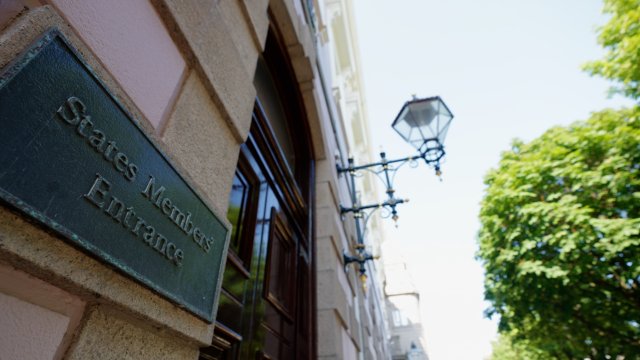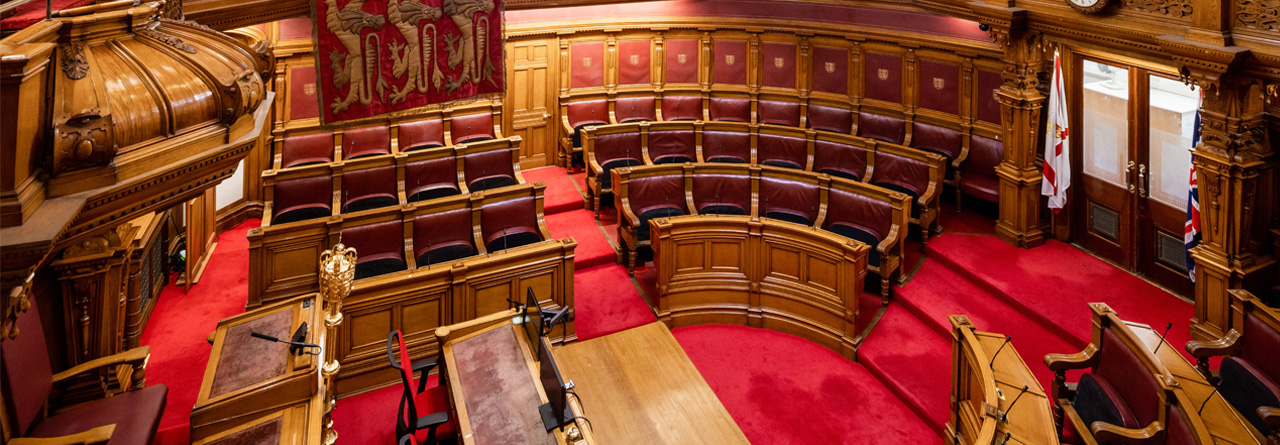News

Contact us

The States Greffe

News
Important
Video content may not be translated

We want to encourage free and fair coverage of States Assembly proceedings in order to promote democracy within Jersey. The Digital and Public Engagement Team at the States Greffe therefore supports the work of the media and provides information related to Assembly business and procedure. In this section you will find links to useful information and a set of frequently asked questions to assist with reporting on States Assembly business.
If you are a journalist and have a specific request that isn’t answered here and/or require an image for your report, please email: statesgreffe@gov.je
You might be interested in
The Chief Minister and Council of Ministers are chosen by the States Assembly.
The Chief Minister is the head of the Government of Jersey and leads the Council of Ministers. The States Assembly chooses the Chief Minister from its elected Members at the first States Meeting following an election. Before this Meeting, elected Members nominate who they think should be Chief Minister. At least six Members must sign the nomination paper. The nominated Member must write a statement to explain their strategic vision for Jersey and how they would act as Chief Minister.
At the Meeting, nominations are read out. Each candidate makes a statement of up to 10 minutes and faces up to 1 hour of questions from other Members – even if there is only one candidate.
If there is only one candidate, that person becomes Chief Minister designate. If there is more than one candidate, the Assembly chooses. Members choose by recorded vote so it is possible to see who has voted for each candidate. The successful candidate becomes Chief Minister designate.
At the second Meeting after an election, the Chief Minister designate puts forward the elected Members they would like to be Ministers. For each Ministerial position, other Members can also make nominations. In every case, each candidate makes a statement of up to 10 minutes and faces questions for up to 20 minutes.
If there is only one candidate, they are declared the Minister. If there is more than one candidate, there is a vote and elected Members choose who they want to be Ministers.
Once all the Ministers have been chosen, the Council of Ministers is formed. At this point, the chosen Chief Minister officially takes up the position.
Once the Assembly has chosen the Council of Ministers, the Chief Minister must choose one Minister to be Deputy Chief Minister and notify the Assembly of their choice. The Deputy Chief Minister acts as Chief Minister when the Chief Minister is absent or incapacitated.
At the Meeting to select the Ministers, the Chief Minister will nominate the chosen States Members as candidates to a Ministerial office and state the order in which they wish the Assembly to vote on them.
For each vacancy, the Bailiff will invite Members to nominate other candidates. Members cannot nominate themselves, and all nominations must be seconded by another Member. Each candidate will make a 10-minute speech and face 20 minutes of questions from the Assembly.
Where the only candidate put forward is the Chief Minister’s nomination, they assume the Ministerial position and office with immediate effect. If there is more than one nominee, the other candidates must withdraw from the Chamber whilst the other candidates are speaking.
An open vote will decide which candidate becomes the appointed Minister. The candidate receiving more than half the votes cast assumes the position. Where none of the candidates put forward achieve this, the candidate receiving the lowest number of votes withdraws and a vote is taken on those remaining.
Where two or more candidates receive the same number of votes, but fewer than all the other candidates, a vote is taken to choose which one will remain in the contest, with the lowest scoring candidate withdrawing each time until only one candidate remains.
Abstentions do not count as votes cast during this process, although Members retain the right to abstain, should they so wish. A candidate can withdraw at any time during this process.
In a situation where there is more than one Ministerial vacancy and the Assembly chooses a candidate other than the Chief Minister’s preferred choice for the first vacancy, the Bailiff will ask the Chief Minister if they wish to maintain their chosen candidate for the subsequent vacancy. If not, the Chief Minister can make new nominations and the same process follows.
The successful candidate will take up the position of Minister and assumes responsibility for that office with immediate effect. They may also then appoint Assistant Minister(s) with the consent of the Chief Minister. The ‘Executive’, which is made up of all Ministers and Assistant Ministers, cannot exceed 21 of the 49 elected Members.
Ministers and Assistant Ministers are unable to hold positions on Scrutiny Panels or the Public Accounts Committee and therefore leave any such roles upon commencing Ministerial responsibilities, triggering further appointment processes in the Assembly.
Ministers are in office until the next appointment to their role, or until they resign or are dismissed by the Chief Minister.
An In-Committee debate may occur to consider reports or draft proposals, when recommendations are made by Panels or if an online petition has reached 5,000 signatures.
The Presiding Officer, acting as Chair of the meeting, invites States Members to speak during the debate and any Member may speak as many times as they like during the In-Committee debate. There is no set time limit to speeches; however, the Chair can ask a Member to finish their speech if it has deviated from their point.A Vote of Censure is an expression of extreme disapproval of a person or body by the entire Assembly. A Vote of Censure can be lodged by any States Member.
A proposition to censure a person or body must be lodged with at least three States Members and the proposer having signed it. As with a Vote of No Confidence, a Vote of Censure can be debated after being lodged for two weeks. It is debated as the first item of public business at the next available meeting.
During the debate, the Member who is the subject of the Censure has the opportunity to speak before the proposer replies at the end of the debate in addition to their right to speak during the debate. There is no time limit for the either speech given by the subject of the Censure.
The standard process is that States Members will debate and vote on the VONC in two weeks (the standard lodging period), although it is possible for the Assembly to agree for this debate to take place sooner.
As part of the debate, the individual or chair of the body in question has the opportunity to speak a second time before the proposer sums up. If the majority of States Members vote against the VONC, the individual or body remains in post.
If a VONC in the leader of a body, such as the Chief Minister or the Chair of a Panel or Committee is adopted, that individual and body will cease to hold office when new Members have been appointed to fill those roles.
In the case of a successful VONC in the Chief Minister, the Assembly must appoint a new Council of Ministers as well as a new Chief Minister, and the previous Council ceases to hold office.
Jersey is a self-governing dependency of the British Crown and is not part of the UK and isn’t represented in the UK parliament. The King is the Head of State for Jersey. The Lieutenant Governor is His Majesty's personal representative.
Jersey has its own fiscal, administrative and legal systems. The Island has a Royal Court, which is equal to the UK’s Crown Court for criminal matters and UK’s High Court for civil matters.
The States Assembly is Jersey’s elected parliament.
As a Crown Dependency, Jersey is self-governing in all local matters and, increasingly, in many international matters.
The States Assembly is made up of 49 elected Members: 37 constituency Deputies and 12 Connétables (representing the Parishes of the Island), plus six individual roles which are not elected by Islanders. General Elections are held every four years.
Functions of the States Assembly include:
The Assembly is also responsible for electing the Chief Minister and Ministers (on an individual basis), as well as the chairs and members of various parliamentary committees and scrutiny panels which play an important role in holding the Government to account.
The Council of Ministers is the Government of Jersey. The Council is led by the Chief Minister and incorporates 12 other Ministers. The Government holds executive power in the Island and is politically responsible for the delivery of services to Islanders.
The Government of Jersey agrees a set of strategic priorities setting out high-level ambitions for the Island where Ministers must focus their efforts.
Yes, please visit Debate Votes page for the latest Assembly votes. This information can also be searched via the individual Members’ pages or in Hansard. A record of how the Assembly voted is also sometimes read out following the debate conclusion, when the result is known and can therefore be viewed live or on Watch on demand.
You might be interested in
